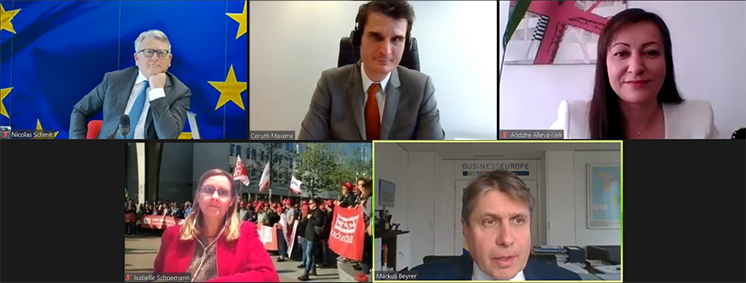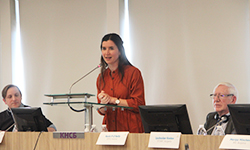BusinessEurope Headlines No. 2023-06
Towards an alternative approach on European works councils

BusinessEurope organised a webinar on “an alternative approach to the European Parliament's proposed revision of the European Works Councils (EWCs) Directive” on 21 February. When addressing European Commissioner for Jobs and Social Rights, Nicolas Schmit, BusinessEurope Director General Markus J. Beyrer stressed that “the Commission should not buy into a revision of the EWCs Directive, as proposed by the European Parliament”. He explained that this would be another negative example of an EU regulatory initiative deeply damaging business competitiveness, at odds with the growing recognition by the Member States and the European Commission that improving our competitiveness is crucial for ensuring a prosperous Europe in the future. BusinessEurope proposes that the Commission comes forward with a recommendation and a code of practice to improve the functioning of European works councils. For such a code of practice to work, it is essential to prepare it with the social partners and EWCs practitioners. The EU business community is committed to engaging constructively in the development of such a code of practice with the Commission and trade unions.
The European Works Councils Directive, as recast in 2009, provides a good legal framework for the functioning of European works councils. It offers social partners at company level the space to negotiate agreements that suit their circumstances and overcome operational difficulties in running EWCs such as consultations timelines, definition of a “transnational” scope, and relations between national and EU level processes.
Contact: Stefan Enica
Our comment
Making Europe stronger on critical raw materials
By Luisa Santos and Alexandre Affre, BusinessEurope Deputy Directors General

The demand for rare earths used in permanent magnets for electric cars and windmills could increase ten-fold in the future. However, Europe is largely dependent on imports from very few suppliers. This illustrates well the magnitude of the challenge ahead of us. Is there a silver bullet to put Europe in a better place? No silver bullet, but a range of actions must be mobilised.
On 14 March, the European Commission will publish its Critical Raw Materials (CRM) Act. If well designed, it can be instrumental in addressing our current weaknesses and supporting our competitiveness. What matters is three-fold:
Domestic extraction/processing and sustainability
Access to critical raw materials is crucial for Europe's competitiveness and the ability for business to advance sustainable economic activities. The Commission's objective to strengthen sustainable extraction and processing of raw materials in the EU is therefore welcome and very timely. The EU needs to act quickly and effectively to secure access to critical raw materials. At the same time, it is important that the initiative is long-term, comprehensive and strategic in scope.
Streamlining and facilitating permits procedures for raw materials extraction and processing in the EU is needed to ensure legal certainty, shorter procedures and clarity in interpretation of potentially conflicting policy objectives. A balance between protecting the environment and biodiversity and sustainable extractive activities, ensuring compatibility under clear conditions between these activities and terrestrial protected areas should be found. Governments and all key stakeholders must work together to improve the social acceptance of mining and processing activities in Europe.
Global diversification
The CRM Act should promote the concept of “open strategic autonomy” in the EU. This can be achieved by combining an open trade and investment policy with other EU policies and instruments, such as in the field of industry, digital, defence, security and health. These policies should be complementary and mutually reinforcing, ensuring that the EU remains attractive to investments and no new barriers to trade are introduced, whilst access to CRMs is secured.
In this regard, to further enable companies to diversify their supply of CRMs, trade agreements are essential. Robust chapters on market access and raw materials can offer a solid legal basis to enable a level playing field and contribute to supply diversification. In the same vein, strategic raw material partnerships with resource-rich third countries, such as the ones the EU has currently in place with Canada, Ukraine, Kazakhstan and Namibia will also help to ensure secure and sustainable supply of critical raw materials and refined materials. The EU should further explore raw material partnerships with other partners, including in Africa (by deepening existing initiatives), as well as in Latin America and the Indo-Pacific region.
Monitoring and governance
The proposal should facilitate access to sustainable raw materials by empowering economic operators that extract and process them, and the value chains depending on them. It should not include a top-down governance model that picks winners, puts unnecessary obligations on economic operators and impedes the level playing field. To create a successful raw materials policy, governments and companies should work together to identify the main challenges and viable solutions. Creation and implementation of an industrial policy without guidance and expertise from the industry is prone to be ineffective.
Public monitoring activities to inform companies about risk of supply chains disruption can be very helpful. However, there are concerns about any reporting obligations that might follow from public monitoring. Providing detailed information about company supply chains can be counterproductive, it can result in sharing sensitive company information and bring about high administrative burden. Therefore, public monitoring should apply purely as a support mechanism.
Contact: Luisa Santos; Affre Alexandre
Europe needs an electricity market design that supports competitiveness
 Europe needs an evolution of the electricity market design that supports competitiveness of the European economy. The current pricing mechanism ensures short-term efficiency and incentivises investment in renewable and low-carbon generation. However, to reach the ambitious European climate targets and at the same time guarantee security of supply, the EU should ensure a future-proof electricity market with a clearer long-term signal for investments. Offering more hedging opportunities for consumers through long-term contracting is a low-hanging fruit for this reform and will help reduce the influence of gas price swings on consumer prices. The use of long-term contracts should be considered first before assessing whether changes to the pricing mechanism would be necessary. That is the message from BusinessEurope position paper with key principles for the upcoming reform of the EU electricity market design. The European Commission’s legislative proposal on EU electricity market reform is expected for 14 March.
Europe needs an evolution of the electricity market design that supports competitiveness of the European economy. The current pricing mechanism ensures short-term efficiency and incentivises investment in renewable and low-carbon generation. However, to reach the ambitious European climate targets and at the same time guarantee security of supply, the EU should ensure a future-proof electricity market with a clearer long-term signal for investments. Offering more hedging opportunities for consumers through long-term contracting is a low-hanging fruit for this reform and will help reduce the influence of gas price swings on consumer prices. The use of long-term contracts should be considered first before assessing whether changes to the pricing mechanism would be necessary. That is the message from BusinessEurope position paper with key principles for the upcoming reform of the EU electricity market design. The European Commission’s legislative proposal on EU electricity market reform is expected for 14 March.
Contact: Agata Zalewska
Priorities of Swedish EU presidency on economic and financial affairs
 The Swedish Minister Counsellor for Economic and Financial Affairs Anders Wahlberg outlined the priorities of the Swedish Presidency of the Council of the EU and discussed progress on issues ranging from the review of the Economic Governance Framework to tax and regulatory proposals currently in the Council, during a meeting with BusinessEurope's Economic and Financial Affairs Committee on 16 February. BusinessEurope members stressed, in light of the need to strengthen public finances, the importance of the Council reaching agreement on the Economic Governance Framework in good time to ensure Member States have clear rules in place when setting their 2024 budgets.
The Swedish Minister Counsellor for Economic and Financial Affairs Anders Wahlberg outlined the priorities of the Swedish Presidency of the Council of the EU and discussed progress on issues ranging from the review of the Economic Governance Framework to tax and regulatory proposals currently in the Council, during a meeting with BusinessEurope's Economic and Financial Affairs Committee on 16 February. BusinessEurope members stressed, in light of the need to strengthen public finances, the importance of the Council reaching agreement on the Economic Governance Framework in good time to ensure Member States have clear rules in place when setting their 2024 budgets.
Contact: James Watson
 EU social partners agreement on digitalisation: progressing with implementation
EU social partners agreement on digitalisation: progressing with implementation
 “We are delighted to note the positive impact that the TransFormWork project has had in bringing awareness about and implementing the 2020 Autonomous Framework Agreement on Digitalisation at national level”, said BusinessEurope Social Affairs Adviser Isaline Ossieur at the final conference on “TransFormWork project – Social partners together for digital transformation of the world of work”, co-organised by the Bulgarian Industry Association in Sofia on 20 February. She explained that by sharing the best practices from several Member States, which encompass not only a wide variety of the agreement’s main concepts, but also various implementation methods, the partners to this project have been able to successfully translate the key content of the agreement into their national contexts. “This final conference is therefore the perfect setting to announce the new European cross-industry social partners’ joint project to develop a digital tool, which aims to raise even further awareness and promote the agreement more broadly to social partners at different levels”, she added. The conference brought together social partner representatives from Bulgaria, Cyprus, Estonia, Ireland, Malta and Romania. They exchanged information on the main outcomes of the project, which aimed to support the implementation of the European Social Partners’ 2020 Autonomous Framework Agreement on Digitalisation.
“We are delighted to note the positive impact that the TransFormWork project has had in bringing awareness about and implementing the 2020 Autonomous Framework Agreement on Digitalisation at national level”, said BusinessEurope Social Affairs Adviser Isaline Ossieur at the final conference on “TransFormWork project – Social partners together for digital transformation of the world of work”, co-organised by the Bulgarian Industry Association in Sofia on 20 February. She explained that by sharing the best practices from several Member States, which encompass not only a wide variety of the agreement’s main concepts, but also various implementation methods, the partners to this project have been able to successfully translate the key content of the agreement into their national contexts. “This final conference is therefore the perfect setting to announce the new European cross-industry social partners’ joint project to develop a digital tool, which aims to raise even further awareness and promote the agreement more broadly to social partners at different levels”, she added. The conference brought together social partner representatives from Bulgaria, Cyprus, Estonia, Ireland, Malta and Romania. They exchanged information on the main outcomes of the project, which aimed to support the implementation of the European Social Partners’ 2020 Autonomous Framework Agreement on Digitalisation.
Contact: Isaline Ossieur
Calendar 
- 18 April: VAT in the digital age: digital / real-time reporting - Implications for businesses and compliance processes
- 6 June: Reuters Event: Responsible Business Europe 2023
- 14-15 June: International IP Enforcement Summit
- 19-20 June: TDI23 – Day of Industry
Not yet a subscriber? Register here.
Reminder: please have a look at our privacy policy